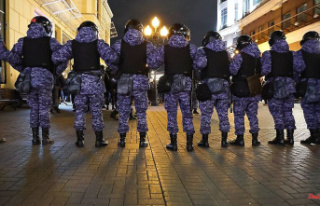Sharp criticism of the annual report by the Federal Government Commissioner for Eastern Europe comes from his counterpart in the left-wing parliamentary group in the Bundestag. The traffic light government is being blamed for agreeing to embargoes against Russia that are "busting" the East.
The left-wing faction's East German representative in the Bundestag, Sören Pellmann, sharply criticized the report presented on Wednesday by the Federal Government's representative for East Germany, Carsten Schneider. The report is "more of an advertising brochure than a management report with hard facts," said Pellmann. Schneider largely ignores the current problems in East Germany. "The energy prices and the consequences of the Russia sanctions are destroying the East," Pellmann told the editorial network Germany (RND). Citizens and businesses would receive horrific bills.
"The current traffic light policy is an attack on the progress of 32 years of unity," Pellmann criticized. Although the Eastern Commissioner has his office next to that of the Chancellor, his influence on Olaf Scholz is obviously small. The east balance of the traffic light a year after the election is disappointing. Except for the minimum wage, which is being eaten up by inflation, so far only announcements have been made.
"We need a powerful protective shield against inflation and impoverishment and a correction of the sanctions that backfire and that harm East Germany in particular more than Putin, such as the upcoming oil embargo," Pellmann demanded.
The deputy chairman of the CDU/CSU parliamentary group in the Bundestag, Sepp Müller, criticized, referring to surveys, that East Germans' satisfaction with the federal government had fallen from 42 percent to 26 percent. Schneider's report cast light and shadow on East Germany, said Müller. On the light side are the increasing economic indicators. On the downside is the lack of recognition of East German lifetime achievements. Müller contradicted the thesis presented by Schneider in the report "Eastern Germany 2022", according to which "the East" does not exist at all, but only individual regions with different development paths.
"Kindergartens, prefabricated buildings and polyclinics are 'made in' East Germany," said Müller. Today we are talking about day care centers, serial construction and medical care centers. "The suppression of East German lifetime achievements does not create unity," says Müller.
According to a study by the University of Leipzig cited in the Schneider report, out of a 17 percent share of the population, only 3.5 percent of the nationwide management positions are occupied by East Germans. Furthermore, according to Schneider, there are still differences in the average income between East and West of 600 euros gross per month.
Müller said: "I expect Minister of State Schneider and the Federal Government to put the pay gap on their agenda. The summit between employers and trade unions can be used for this purpose. Strong collective bargaining agreements in the East lead to equal pay in all parts of the country East Germans must be given more consideration when it comes to top positions, for example at the Reconstruction Loan Corporation, the employment agency and especially in ministries."












